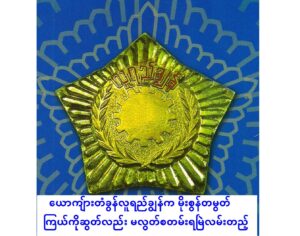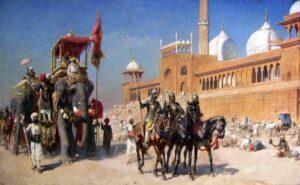In the chronicles of Myanmar history—both ancient and modern—there are moments when silence breaks, and a soul rises to say, “I shall no longer live under a wicked king.”
This is not merely a cry of rebellion. It is a profound declaration of dignity.
A powerful example comes from U Kulah’s royal chronicle during the Pagan era, where a monk courageously rebuked an unjust king who had seized power through betrayal. With a piercing admonition, the monk thundered:
“You, wicked and defiled ruler!
You fear not the karmic retribution that awaits those who commit evil in samsara.
Do you believe your body shall be forever young and immune from death, just because you sit on a throne?
There has never been a more disgraceful ruler than you.
I shall no longer live under a wicked king.”
With that, he turned his back and departed to the distant land of Sri Lanka (Sīhaḷa), choosing truth over comfort, exile over complicity.
This same spirit echoes in today’s Myanmar. Countless individuals—silent while still under the grip of oppression—have later walked away from the shadows of military rule, not out of cowardice, but out of moral survival.
Like many others, I too never dared speak a word while still inside. But those who truly knew me understood the reason I left: the Ne Win regime’s systemic racial and religious discrimination. That was the final line I could not cross.
In a moral world, exile is not surrender—it is resistance. Choosing to leave a homeland polluted by injustice can be more honorable than remaining silent under tyranny.
When the Nation Becomes the Danger
An ancient Buddhist ethical verse offers this timeless warning:
“One must flee the danger of a horned beast from fifty paces,
The danger of a horse from a hundred,
The danger of an elephant from a thousand,
But the danger of the wicked—one must flee the entire land.”
The didactic rhythm of the original Lokanīti verse and makes the moral lesson clear: the greater the threat, the greater the distance—and with truly wicked people i.e. Military Junta and AA, only total departure will do.
The Dilemma of the Displaced
To migrate is never easy. It means leaving behind familiar soil, language, ancestry, and sometimes even identity. But for the oppressed, it can be an act of spiritual survival.
This is the moral paradox of Myanmar’s exiles: the very people who leave are often the ones who loved their country the most—but who refuse to see it poisoned by racism, religious bigotry, or militarized brutality.
Some who left were once celebrated students—Outstanding Students (Lu Ye Chuns). Some were monks, poets, doctors, or simply farmers. But all shared a silent decision: they would not live under a wicked king.
Closing Thought
Let us not mock or forget those who left. Many had no choice. Many saw what others refused to see. And many continue, from afar, to fight for justice—not with guns, but with truth, memory, and moral clarity.
Because in every era, there will be those who speak softly, stand firmly, and walk away with dignity.
And sometimes, walking away is the loudest message of all.
The following paragraph written by the famous Journalist Mirror U Thaung explained my sentiments.
မင်းဆိုးမင်းညစ်အောက်တွင် ငါမနေပြီ
ဦးကုလားရာဇဝင်တွင် ပုဂံခေတ်က နောင်တော်ကို လုပ်ကြံကာ နန်းတက်သူ ကုလားကျမင်းအား ပံ့တကူမထေရ်ကြီးက
“ဟယ် – မင်းဆိုးမင်းညစ်၊
နင်ကား သံသရာဝယ် ခံရအံ့သော မကောင်းမှုကို မကြောက်၊
ဤစည်းစိမ်ကို ရလျှင် နင်၏ ကိုယ်ခန္ဓာသည် မအိုမသေပြီမှတ်သည်လော။
လောကတွင် နင့်ထက် ပျက်သော မင်းမရှိ၊
မင်းဆိုးမင်းညစ်အောက်တွင် ငါမနေပြီ”
ဟု လက်ညှိုးငေါက်ငေါက်ထိုးကာ သီဟိုဠ်ပြည်သို့ ထွက်သွားကြောင်း ဌာန်ကရိုဏ်းကျကျ ဖတ်ရှုခဲ့ရသည့် အရသာမှာ ကြီးမားလှပါ၏။ ။
Source: (၅၆) ထွက်တော်မူ နန်းကခွာတယ် (ကြေးမုံဦးသောင်း)
Lu Min Han shared.
ဦးချိုရှိသော သတ္တဝါကို အတောင်ငါးဆယ်အရပ်မှရှောင်ကြဉ်ရာ၏။ မြင်းကိုကား အတောင်တစ်ရာမှ ရှောင်ကြဉ်ရာ၏။ အစွယ်ရှိသောဆင်ကိုကား အတောင် တစ်ထောင်မှရှောင်ကြဉ်ရာ၏။ သူယုတ်မာတို့ကိုမူကား တိုင်းပြည်ရပ်ရွာ ကိုစွန့်၍ပင်ရှောင်ကြဉ်ရာ၏။
-လောကနီတိ မိတ္တကဏ္ဍ။





